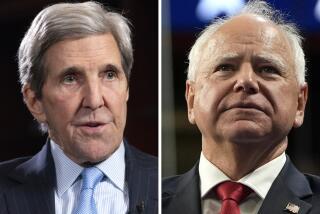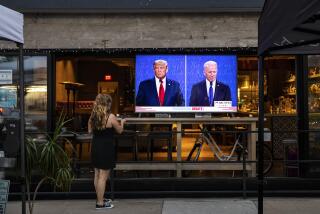Kerry to Ramp Up His Advertising, While Bush Scales Back
- Share via
NEW YORK — Flush with newly raised cash, Democratic presidential candidate John F. Kerry said Thursday he planned to beef up his television advertising just as President Bush was rolling back his own efforts on commercial airwaves.
The Massachusetts senator said he would soon begin a new round of TV advertising with a “positive, affirmative” message about his life story and political agenda.
Meeting with financial backers, Kerry said he would run a muscular campaign to counter Republican attacks. He acknowledged that he remained unfamiliar to many voters.
“I am going to put real choices in front of the country,” he told about 100 donors at a breakfast fundraiser in Manhattan. Using salty language, he added, “This isn’t going to be any mealy-mouthed, half-assed, you know, namby-pamby campaign.”
For the last month, Bush has aired TV and radio commercials that question the senator’s judgment on defense and accuse him of having a “troubling” record of advocating tax increases.
Today, the president’s reelection campaign plans to revive an attack on Kerry’s Iraq position that aired last month in West Virginia and on national TV.
The 30-second ad, which will get a broader airing over the next week in battleground states, criticizes Kerry for voting last year against $87 billion in funding for operations in Iraq and Afghanistan after voting in 2002 to authorize the use of force.
The Bush ad also mocks the senator by directly quoting his somewhat contorted explanation for the two votes. (Kerry says he supported money for U.S. troops but voted against the funding package to protest Bush’s unwillingness to roll back his tax cuts to help pay for it.)
Bush, meanwhile, is taking steps this week to reduce his ad spending in 17 swing states. In a conference call with reporters, campaign officials said the president would briefly halt his radio advertising and -- for now -- run just one TV commercial per week instead of the two or three that had been on the air since March 4.
That means Thursday’s lineup of two paid TV attacks on Kerry and one ad touting Bush’s record will shrink today to a single jab at Kerry.
“We had always said there were going to be ebbs and flows to this effort,” said Matthew Dowd, a senior strategist for the campaign.
He and Bush campaign manager Ken Mehlman denied a Democratic contention that the first weeks of Bush’s ad campaign were a failure. They said the public was growing more skeptical of Kerry as it learned more about him. Independent polls offer conflicting assessments.
What seems clear, though, is that the ad campaign on TV and radio is about to enter a new phase. Bush, having spent by some estimates as much as $50 million on ads, is temporarily scaling back. Kerry, having raised $50 million in the first three months of the year and an additional $12.5 million this week in a swing through the Northeast, is picking up.
A New York event Wednesday raised an estimated $6.5 million for Kerry. If verified, a campaign finance expert said, that total would set a one-night record for a presidential candidate.
Kerry told donors in New York that his campaign had raised more than $35 million over the Internet in the last seven weeks.
Erik Smith, executive director of the Media Fund, a liberal group that is airing ads critical of Bush, said that given the change in advertising volume by the two candidates, “my opinion is you’ll have a more level playing field.”
The tactical shift comes as most independent polling shows Bush and Kerry in a statistical tie nationwide.
For Kerry, a four-term U.S. senator and Vietnam veteran, the most immediate challenge is to get voters to hear his story in his own words. So far, voters in swing states have heard more about Kerry from Bush ads than from the senator himself.
In his remarks Thursday, heard by a pool reporter, Kerry said the campaign must be about “common sense and truth,” not just Democratic or Republican labels, and that he believed he had shown his ability to work across party lines to get things done.
He pointed, in particular, to his work with Sen. John McCain (R-Ariz.) to normalize relations with Vietnam.
“I am not a redistribution Democrat,” he said. “Fear not. I am not somebody who wants to go back and make the mistakes of the Democratic Party of 20, 25 years ago.”
Times staff writer Lisa Getter contributed to this report. Anderson reported from Washington and Gold from New York.
More to Read
Get the L.A. Times Politics newsletter
Deeply reported insights into legislation, politics and policy from Sacramento, Washington and beyond. In your inbox twice per week.
You may occasionally receive promotional content from the Los Angeles Times.










